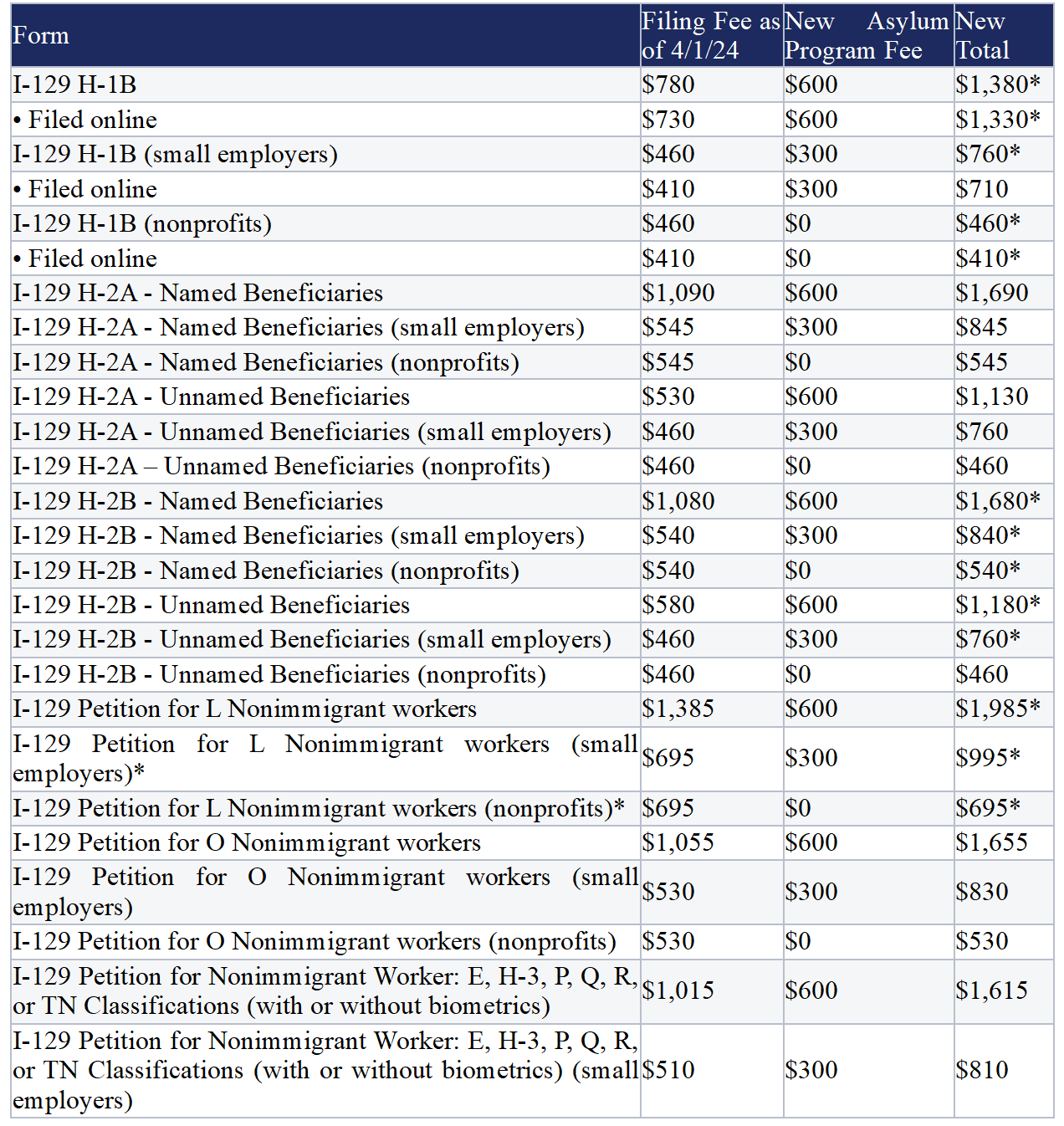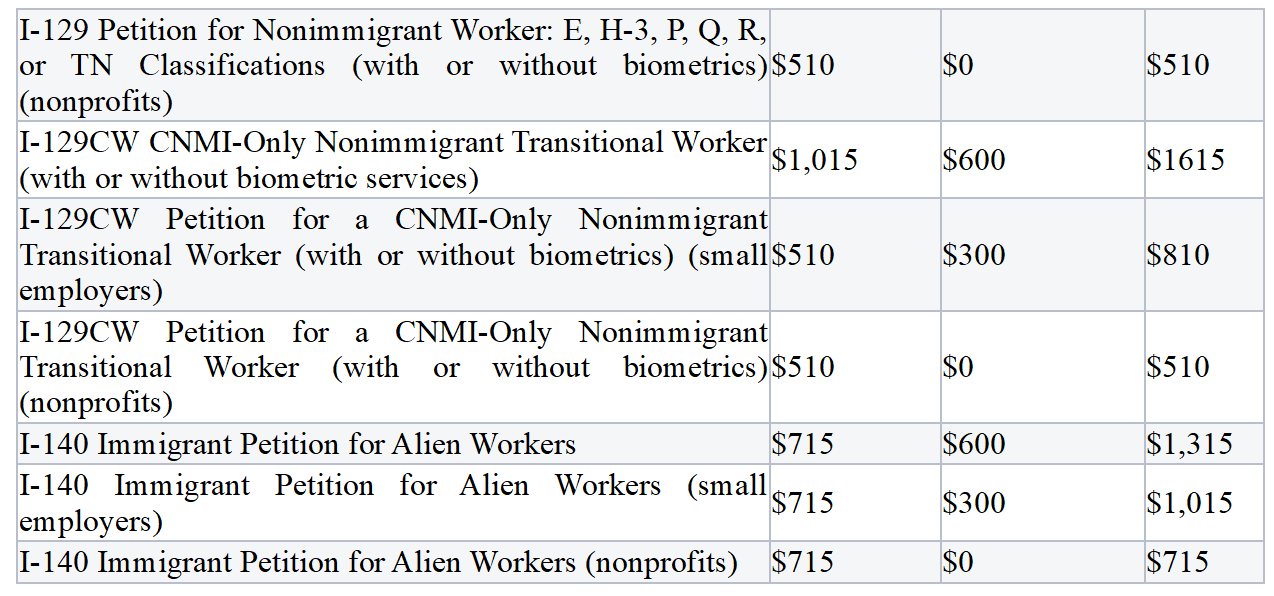What You need to Know about the New USCIS Fee Schedule By: Brittany T. Faith and Molly E. Green
New Fee Schedule Will Take Effect on April 1, 2024
US. Citizenship and Immigration Services (“USCIS”) published its Final Fee Schedule Rule on January 31, 2024, and will take effect on April 1, 2024. The new fee schedule impacts a wide range of immigration benefits, including family, humanitarian, and employment-based benefits. The rule also provides additional fee exemptions for certain humanitarian categories and makes changes to certain other immigration benefit request requirements.
USCIS is a primarily fee-funded agency, which means its budget comes from application fees rather than Congress or taxes. This self-sustaining model means that periodic fee changes are necessary to the agency’s continued operation. The chart linked here created by USCIS outlines expected immigration benefits and their associated application fees. To understand how the price increase could impact your application, reference the “Final Fee” column. The “Current vs. Final Fees” column will show the dollar amount and percentage that the filing fees for your application will change.
USCIS will continue offering fee waivers for specific forms and applicants who show inability to pay. Applicants should check the USCIS website or with their immigration attorney for the latest information on fee waivers. In addition, with new fees come new forms, so if you have already completed the current forms, you will either need to file before April 1 or review below regarding the forms transition grace period to determine if your application qualifies for the grace period. We have outlined some specific changes below.
There will be no Grace Period for Certain New Forms After April 1
As part of the final rule, it announced that there will be new forms. USCIS will accept prior editions of most forms during a grace period from April 1, 2024, through June 3, 2024. During this grace period, USCIS will accept both previous and new editions of certain forms, filed with the correct fee.
Please note that there will be no grace period for the following new forms, however, because they must be revised with a new fee calculation: I-129, Petition for Nonimmigrant Worker; Form I-140, Immigrant Petition for Alien Workers; I-600, Petition to Classify Orphan and an Immediate Relative; and I-600A, Application for Advance Processing of an Orphan Petition.
Changes to Form I-129 and Form I-140 Fees
The Final USCIS Fee Schedule, set to take effect on April 1, 2024, establishes a new fee for Form I-129, I-129CW, and Form I-140. The new Asylum Program Fee will help fund asylum adjudications. The increase in asylum adjudications in the past few years has resulted in USCIS detailing adjudicators from Service Center Operations (SCOPS) and Field Office Directorate (FOD), the directorates that adjudicate employment-based cases, to work asylum cases. This fee will be assessed based on the size and type of petitioning employer.
Similarly, the Final Rule establishes a tiered filing fee for Form I-129 dependent on the size and type of employer. Small businesses with 25 or less full-time equivalent (FTE) employees will continue to pay the current $460 filing fee and half of the Asylum Program fee. Nonprofit organizations will continue to pay the current $460 filing fee and are not subject to the Asylum Program Fee.
Under the Final Rule, forms filed online may be eligible for a discount of $50. This should include the Form I-129 for FY2025 H-1B petitions, as USCIS recently announced that the Form I-129 for H-1B petitions will be available for online filing this cap season.


* Petitioners may be subject to additional fees, such as the ACWIA fee, Fraud Prevention and Detection fee, or Public Law 114-113 fee.
Changes to the Form I-485 Fee Structure
Previously, the fee for the Form I-1485 included the cost of ancillary benefit applications for employment authorization (Form I-765) and advance parole (Form I-131), but these fees are now being charged separately because USCIS stated that not all applicants need or want these ancillary benefits. The Final Rule also reduces the that the cost of a Form I-765 filed concurrently with or based on a pending adjustment of status by 50 percent. Finally, the Final Rule provides a reduced fee for certain forms that are filed online, including the Form I-765. However, the online filing reduced fee is not applicable to the reduced fee form I-765.
Per the fees which will be noted in the chart which will be on the USCIS Website by April 1, 2024, if an applicant who is over 14 years of age files an adjustment of status application on or after April 1, 2024 and also applies for work authorization and advanced parole the new total cost will be $2,330 an increase from $1,225. (Link to USCIS Website: https://www.uscis.gov/)
What You Can Do
If you are ready and eligible to file, GKH recommends that you file your immigration application prior to the April 1, 2024 fee increase and form change if you want to benefit from the current USCIS fee structure and existing forms. Additionally if you are a current client, you should work with our team to prepare cases for submission before April 1. If you are interested in becoming a client, please call the GKH Immigration Group at (423)756-8400 for more information. GKH attorneys pride themselves on being on the forefront of new immigration developments to best serve clients located around the world. We help clients from around the U.S. and the world.
Learn more about the authors:











